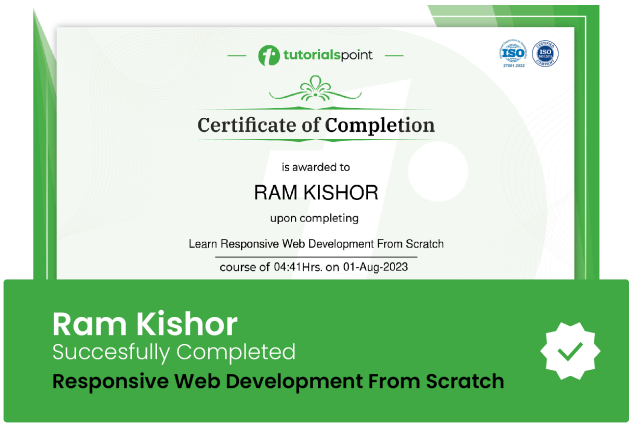Data Science Interview Questions & Answers
Prepare for Data Scientist and Machine Learning Engineer interviews by learning the frequently asked interview questions
Lectures -5
Duration -2.5 hours

30-days Money-Back Guarantee
Get your team access to 10000+ top Tutorials Point courses anytime, anywhere.
Course Description
A warm welcome to the Data Science Interview Questions & Answers course by Uplatz.
Uplatz provides this frequently asked list of Data Science Interview Questions and Answers to help you prepare for the Data Scientist and Machine Learning Engineer interviews. This comprehensive list of important data science interview questions and answers might play a significant role in shaping your career and helping you get your next dream job. You can get into the mainstream of the Data Science world learning from this powerful set of Data Science interview questions.
Let's get started!
What is Data Science?
Data Science can be defined as multidisciplinary blend of trends prediction, data inference, algorithm development, and technology to solve analytically complex problems. At the core of data science is nothing but data. Data science involves mining and analysis of loads of raw information, streaming-in data and enterprise data warehouses. Advanced AI capabilities can then be built on top of it providing accurate prediction and inference capabilities. Data science is ultimately about using this data in creative ways to generate business value. Data science starts with data exploration to understand pattern or characteristics within the data. This requires a big dose of analytical creativity as well.
Data Science has been hugely popular amongst learners since the domain has expanded vastly and has brought a major transformation in the way businesses work. Factors such as huge dependence and consumption of data have also led to a surge in extracting, processing, and analyzing data into information that can be optimally utilized as a resource. This is the reason why the demand for Data Science professionals has increased exponentially in the last few years.
Who is a Data Scientist?
Data scientists are basically analytical experts who utilize their skills in technology, science, statistics to detect trends and manage data. They use industry knowledge, contextual understanding, and relationships & dependencies between different elements to uncover solutions to business challenges. Data scientists can also be termed as data and big data wranglers, collecting, cleansing, and analyzing massive sets of structured and unstructured data. A data scientist’s role combines computer science, statistics, and mathematics. They analyze, process, and model data then interpret the results to create actionable plans for companies and other organizations. A data scientist’s work typically involves making sense of messy, unstructured data, from sources such as smart devices, social media feeds, and emails that don’t neatly fit into a database.
Data Scientist job scope
The world is shaping according to the latest trends and one such trend on the top of all is Data Scientists. Data Science has become is one of the most sought-after career options for today’s young generation. From small startups to medium-tier organizations looking for growth to multinational companies, every organization requires a Data Scientist today to analyze the huge amount of data an organization generates and stores. As such, there is huge scope of Data Science in the present and future scenarios. Becoming a Data Scientist is an exciting path, but you cannot learn data science overnight, it needs consistent hard work and dedication.
Companies today are grappling with how to make sense of an inordinate amount of disparate data. The ability to transform a sea of data into actionable insights can have a profound impact - from predicting the best new diabetes treatment to identifying and thwarting national security threats. That’s why businesses and government agencies are rushing to hire data science professionals who can help do just that. By extrapolating and sharing these insights, data scientists help organizations to solve vexing problems. Combining computer science, modeling, statistics, analytics, and math skills along with sound business sense, data scientists uncover the answers to major questions that help organizations make objective decisions.
Data Scientist salary packages
As per Indeed, a leading job portal, the average annual salary of a Data Scientist is $119,983. Similarly, Glassdoor mentions $116k as the Data Scientist's average annual compensation. This implies that becoming Data Science is one of the premium technology fields commanding great compensation with a huge future growth potential.
Who this course is for:
- Candidates preparing for Data Scientist or ML Engineer job interviews
- Newbies and Beginners aspiring to become Data Scientists
- Data Scientists & Senior Data Scientists
- Machine Learning Engineers
- Data Analysts & Consultants
- CTOs (Chief Technology Officer)
- Managers - Data Science / Machine Learning
- Data Science Delivery Leads
- Big Data Analysts
- Data Science Enthusiasts
- Entrepreneurs (to understand what to ask in Data Scientist interviews)
- Heads of IT/Data Department
- Data Platform Architects
Goals
What will you learn in this course:
Get familiarized with popular Data Science Interview Questions and Answers
Prepare for Data Scientist interview
Prepare for Machine Learning Engineer interview
Practice the Data Science FAQs
Revise the important Data Science concepts
Understand what is Linear Regression, and how does it work? What assumptions do you have to make?
Explain Logistic Regression, and what is it used for? In LR, what exactly is the loss function?
Explain the difference between classification and regression
Define what is Natural Language Processing (NLP) and why is it important. Give a few examples of NLP in the actual world.
Understand the advantages and disadvantages of using evaluation metrics? What does Confusion Matrix imply to you?
Learn how may the Confusion Matrix be used to assess model performance?
Understand what does sampling have to do with anything? What are some sampling techniques?
Explain the differences between Type 1 and Type 2 errors? In what situations do Type 1 and Type 2 mistakes become problematic?
Understand and practice the other important Data Science questions asked in interviews
Prerequisites
What are the prerequisites for this course?
Enthusiasm and determination to make your mark on the world!

Curriculum
Check out the detailed breakdown of what’s inside the course
1 - Data Science Interview Questions
1 Lectures
-
1 - Data Science Interview Questions 30:12 30:12
2 - Data Science Interview Questions
1 Lectures

3 - Data Science Interview Questions
1 Lectures

4 - Data Science Interview Questions
1 Lectures

5 - Data Science Interview Questions
1 Lectures

Instructor Details

Uplatz
eCourse Certificate
Use your certificate to make a career change or to advance in your current career.

Our students work
with the Best


































Related Video Courses
View MoreAnnual Membership
Become a valued member of Tutorials Point and enjoy unlimited access to our vast library of top-rated Video Courses
Subscribe now
Online Certifications
Master prominent technologies at full length and become a valued certified professional.
Explore Now


 Updated on Apr, 2024
Updated on Apr, 2024
 Language - English
Language - English
